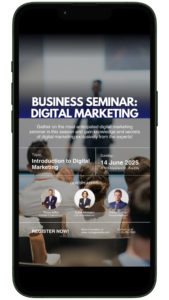In the dynamic world of event planning, organizing a seminar stands as a significant challenge. Whether it’s an estate planning seminar, a conference on retirement, or any other educational event, success hinges on meticulous planning and effective communication. In this digital age, tools like Hobnob have revolutionized how we manage and interact with our attendees, making the process smoother and more engaging.
The Art of Seminar Planning
Understanding Your Seminar’s Purpose: A Comprehensive Insight
The foundation of every successful seminar, whether it’s a corporate event, a continuing education workshop, or a retirement planning conference, lies in a deep understanding of its core objectives. Identifying the nature of your event is the first step in a meticulous event planning process. Is your seminar aimed at professionals seeking insights in corporate strategies, individuals interested in estate planning, or perhaps retirees looking for guidance in planning their post-retirement life? Grasping the specific purpose of your event is essential.
This initial step of recognition guides every aspect of your seminar planning. It shapes your approach to target audience identification, ensuring that your marketing efforts, whether through social media, email campaigns, or direct invitations, reach the right participants. Understanding the seminar’s purpose is not only about knowing who will attend but also about comprehending what they seek to gain from your event. Are they looking for knowledge, skills, networking opportunities, or a combination of these?
Once the target audience and objectives are clear, this clarity plays a pivotal role in developing the seminar’s program. It influences the selection of seminar materials, the planning of interactive sessions, and the choice of seminar themes. Each element, from the quick links provided in your digital resources to the related articles and links, must align with the overall goal of your seminar.
Moreover, understanding the purpose of your seminar aids significantly in choosing the right keynote speaker and guest speakers. These individuals are not just presenters; they are pivotal to the success of your event. Their expertise, experience, and ability to engage with the audience can turn a standard seminar into a memorable, impactful event. The speaker selection should resonate with the seminar’s theme, contributing to the educational and motivational aspects of your conference or workshop.

Venue Selection: The Heart of Your Event and its Success
Selecting the right venue is a critical and central element in the planning process of any conference, seminar, or corporate event. The choice of venue goes beyond mere aesthetics; it plays a pivotal role in determining the success of your event. When planning for an event, whether it’s a professional conference, an estate planning seminar, or a continuing education workshop, the venue should not only resonate with the event’s theme but also cater to the specific needs and comfort of your attendees.
In conference planning, the logistics surrounding the venue selection are key. One must ponder over several vital questions. Is the venue conveniently located and easily accessible for all participants, including those who may be traveling from out of town? Accessibility plays a significant role in ensuring high attendance and is a crucial consideration for events like retirement planning conferences or corporate workshops, where participants may vary in age and mobility.
Additionally, the technical capabilities of the venue are paramount. Does it have the necessary technical equipment to facilitate a successful event? This includes sound systems, projection equipment, and reliable internet connectivity, especially crucial for seminars that may involve interactive sessions or live demonstrations. The availability of these technical facilities is essential for ensuring that presentations by keynote speakers and guest speakers are delivered effectively.
Furthermore, consider the venue’s capacity and layout. It should comfortably accommodate your expected number of attendees, allowing for various activities planned during the event. This could range from breakout sessions, interactive workshops, to networking areas. The layout should facilitate easy movement and interaction among participants, enhancing the overall experience of the event.
Moreover, the ambiance of the venue contributes significantly to the event’s atmosphere. For corporate events and seminars, a venue that projects professionalism and sophistication may be desirable, while a more relaxed and open space might be appropriate for creative workshops or informal gatherings.t is essential, as it directly impacts their engagement and learning experience.
Leveraging Technology for Efficiency

In today’s digital age, incorporating technology like Hobnob is essential for enhancing event planning efficiency. This innovative app transforms how you manage events, whether it’s a corporate conference, a retirement planning seminar, or a continuing education workshop.
Hobnob excels as a digital invitation and event management tool, enabling effective communication with guests through real-time chat and instant text updates. Its RSVP management feature is crucial for accurate attendee headcount, impacting key logistics aspects like venue selection and catering.
Moreover, Hobnob’s ability to manage photos keeps potential attendees engaged, maintaining their interest in your upcoming event. This feature is especially relevant in our digitally-driven world, aligning with the digital habits of your target audience, whether they are corporate professionals or individuals seeking personal development.
Seminar Materials and Quick Links: Enhancing Attendee Engagement and Convenience
In the realm of event planning, particularly for seminars and workshops, providing attendees with essential materials is a key element in enriching their experience. In today’s fast-paced, digital-centric world, leveraging apps like Hobnob to distribute these resources is not only efficient but also expected by tech-savvy participants.
Streamlining Access to Information with Digital Tools
Utilizing digital platforms like Hobnob for sharing seminar materials offers a streamlined, user-friendly way to distribute information. This approach allows attendees to access presentations, reading materials, schedules, speaker bios, and other relevant documents with ease. The use of quick links within these apps ensures that attendees can effortlessly find and engage with the material, enhancing their preparedness and involvement in the seminar.
Improving Attendee Experience through Efficient Resource Management
The integration of digital tools for material distribution significantly improves the participant experience. It removes the physical barriers and limitations of traditional paper-based methods, allowing for instant access to information. This immediate availability is particularly advantageous for interactive sessions or workshops where real-time access to data and resources can foster a more dynamic and engaging learning environment.
Adding Value with Exceptional Customer Service
Providing seamless access to seminar materials through apps like Hobnob reflects a high level of customer service, crucial in the event management industry. This digital approach not only simplifies logistics for the event organizer but also demonstrates a commitment to meeting the needs and expectations of attendees. It shows foresight in anticipating participant needs, thereby enhancing the overall perceived value of the event.
Marketing Your Event: Strategies for Maximizing Attendance and Engagement
Effective event marketing is crucial in ensuring the success of any seminar, workshop, or conference. It’s the driving force that not only attracts attendees but also creates buzz and anticipation for your upcoming event. In the digital era, leveraging various platforms and strategies is key to reaching and engaging your target audience.
Harnessing the Power of Social Media
Social media is an invaluable tool in the event marketer’s arsenal. Platforms like Facebook, Twitter, Instagram, and LinkedIn offer vast networks to tap into. Share engaging content related to your event, including highlights of the program, profiles of keynote speakers, and unique selling points of your seminar. Utilizing these platforms for event promotion not only increases visibility but also encourages sharing and word-of-mouth marketing.
Utilizing Related Links and Digital Media
Incorporate related links in your digital marketing efforts. This could include links to your event website, online registration pages, or articles about similar successful events. These links provide potential attendees with easy access to more information and a straightforward way to register or learn more.
Leveraging Testimonials and Articles
Feature testimonials from past attendees or successful events you’ve organized. These endorsements serve as social proof, building credibility and trust with potential attendees. Sharing related articles or blog posts that discuss the benefits of attending such events or highlighting the themes of your seminar can also spark interest and establish authority in your field.
Expanding Reach with Email Marketing and Collaborations
Don’t overlook the power of email marketing. Send newsletters or targeted emails to your existing database with compelling reasons to attend your event. Collaborations with influencers, industry experts, or media partners can also expand your reach, tapping into their followers or readers and drawing a broader audience.
The Planning Process: A Step-by-Step Approach
Organizing a seminar requires meticulous planning and a strategic approach. Every step, from defining your event to post-event follow-up, plays a crucial role in ensuring a successful outcome.
Defining Your Seminar’s Objectives: Begin with an explicit event plan, focusing on the main themes of your seminar, such as estate planning or retirement planning. Determine who your featured events are targeting, considering the needs and interests of your potential attendees, including professionals in specific fields or individuals interested in topics like estate or retirement planning.
Assembling Your Event Planning Team: Whether you’re a solo event planner or part of a larger organization, it’s crucial to build a team skilled in various areas such as event logistics, event marketing, customer service, and more. This team will be instrumental in organizing successful events, including seminars, workshops, and corporate events.
Leveraging Technology Efficiently: Utilize tools like Hobnob effectively to manage the complexities of event organization. These tools can simplify managing invitations, RSVPs, and enhancing participant engagement, which is vital for a successful seminar.
Developing a Robust Event Marketing Strategy: Craft a dynamic event marketing plan to reach your target audience. Use social media platforms, email campaigns, and your dedicated event website to effectively market your upcoming events, ensuring you reach the right demographic with your message.
Engaging Your Audience Effectively: Maintain constant engagement with your attendees. Employ interactive sessions, breakout sessions with keynote speakers or guest presenters, and regular updates to keep interest piqued. This approach ensures that your seminar remains a topic of discussion among your attendees.
Coordinating Vendors and Speakers: Ensure seamless coordination between your vendors and speakers. This involves arranging for their specific needs, confirming their roles and contributions to the seminar, and ensuring they align with the seminar’s objectives.
Rehearsing and Reviewing: Conduct a comprehensive event check before the event. This involves ensuring all technical equipment is functioning correctly and that your team, including guest speakers and event organizers, is fully prepared for the seminar.
Post-Event Engagement: Following your seminar, engage in a thorough follow-up process with participants. Gather feedback to understand their experience, which is invaluable for improving future events such as similar seminars, workshops, or corporate events. This step is crucial in the planning process for upcoming events, allowing you to refine your approach and ensure continued success in event planning.
Conclusion
The art of planning seminars, such as an estate planning seminar or a retirement-focused conference, demands a harmonious blend of strategic thinking, astute use of technology, and meticulous attention to detail. This process, akin to a meticulous event planning checklist, involves several key components.
Firstly, understanding your target audience is crucial. Whether they are participants in a retirement seminar or professionals seeking continuing education, their needs should guide your planning. The selection of a suitable venue, whether for a small workshop or a large corporate event, plays a pivotal role in this. The venue must not only resonate with the theme of the seminar but also cater to the logistical needs of similar events.
Utilizing tools like Hobnob becomes instrumental in this context. It streamlines the event planning process, allowing you to efficiently manage guest speakers, seminar materials, and quick links to related articles and related links. This technology aids in creating an event that is not just a gathering but a landmark experience for attendees.
Social media and event marketing are key in reaching potential attendees and building anticipation for upcoming events. A successful seminar leverages these platforms to engage its audience well before the event date.
Incorporating interactive sessions, such as breakout sessions with keynote speakers or guest presenters, enhances the educational and engaging aspect of the seminar. Providing a platform for interactive learning and networking makes the seminar more than just an event; it becomes a milestone in the attendees’ professional or personal development.
Remember, each seminar, whether it’s a conference on estate planning or a corporate event, is a stepping stone to greater success. It’s a good idea to reflect on past events, using them as a benchmark to refine future events. This ongoing process, from selecting vendors to finalizing the seminar program, is a journey towards creating a successful event.






















